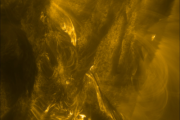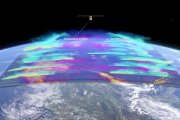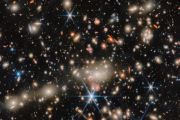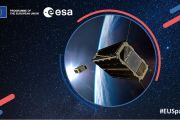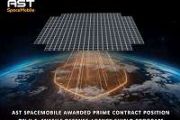
Copernical Team
EIRSAT-1 novel control payload successfully demonstrates advanced satellite pointing in space
This request seems a bit unusual, so we need to confirm that you're human. Please press and hold the button until it turns completely green. Thank you for your cooperation!
Press and hold the button
If you believe this is an error, please contact our support team.
185.132.36.159 : 8ed8610f-aa83-478f-83e1-6afab1ca
Cleaning up space with gecko technology
This request seems a bit unusual, so we need to confirm that you're human. Please press and hold the button until it turns completely green. Thank you for your cooperation!
Press and hold the button
If you believe this is an error, please contact our support team.
185.132.36.159 : 8b6e36cc-595f-4646-89f8-2d0ab7ae
Robots team up to explore planetary lava caves
This request seems a bit unusual, so we need to confirm that you're human. Please press and hold the button until it turns completely green. Thank you for your cooperation!
Press and hold the button
If you believe this is an error, please contact our support team.
185.132.36.159 : 297fc7b9-1dd3-4c54-8f7c-364e803f
MetOp-SG-A1 and Sentinel-5: from cleanroom to space
 Video:
00:04:21
Video:
00:04:21
Europe’s first MetOp Second Generation, MetOp-SG-A1, weather satellite – which hosts the Copernicus Sentinel-5 mission – has launched aboard an Ariane 6 rocket from the European spaceport in French Guiana. The rocket lifted off on 13 August at 02:37 CEST (12 August 21:37 Kourou time).
MetOp-SG-A1 is the first in a series of three successive pairs of satellites. The mission as a whole not only ensures the continued delivery of global observations from polar orbit for weather forecasting and climate analysis for more than 20 years, but also offers enhanced accuracy and resolution compared to the original MetOp mission – along with new measurement capabilities to expand its scientific
FLEX instrument meets its satellite
 Image:
FLEX instrument meets its satellite
Image:
FLEX instrument meets its satellite Early Earth may have had active plate tectonics far sooner than thought
 Researchers investigating the Hadean Eon, which lasted from 4.6 to 4.0 billion years ago, have uncovered signs that plate tectonics began far earlier than widely assumed. The era started with Earth's formation and a colossal Mars-sized impact that created the Moon, melting the planet's interior. Crust solidification occurred about 4.5 billion years ago, but subsequent tectonic activity has been
Researchers investigating the Hadean Eon, which lasted from 4.6 to 4.0 billion years ago, have uncovered signs that plate tectonics began far earlier than widely assumed. The era started with Earth's formation and a colossal Mars-sized impact that created the Moon, melting the planet's interior. Crust solidification occurred about 4.5 billion years ago, but subsequent tectonic activity has been US French satellite SWOT captures Kamchatka tsunami in unprecedented detail
 Data from a joint NASA and CNES mission has provided valuable insights to refine tsunami forecasting models, potentially improving coastal safety worldwide.
The Surface Water and Ocean Topography (SWOT) satellite recorded the tsunami generated by an 8.8 magnitude earthquake off Russia's Kamchatka Peninsula on July 30. Passing over the area roughly 70 minutes later, SWOT measured the wave's
Data from a joint NASA and CNES mission has provided valuable insights to refine tsunami forecasting models, potentially improving coastal safety worldwide.
The Surface Water and Ocean Topography (SWOT) satellite recorded the tsunami generated by an 8.8 magnitude earthquake off Russia's Kamchatka Peninsula on July 30. Passing over the area roughly 70 minutes later, SWOT measured the wave's SpaceX launches Amazon Kuiper satellites in 100th 2025 mission
 SpaceX on Monday launched two dozen Kuiper Internet satellites into orbit Monday on its 100th mission of 2025.
The rocket blasted off from Cape Canaveral Space Force Station in Florida on Monday at 8:35 a.m. EDT, in the 97th Falcon 9 launch of the year. It was the third attempt for this particular mission, as the first two attempts over the weekend were scrubbed due to weather condition
SpaceX on Monday launched two dozen Kuiper Internet satellites into orbit Monday on its 100th mission of 2025.
The rocket blasted off from Cape Canaveral Space Force Station in Florida on Monday at 8:35 a.m. EDT, in the 97th Falcon 9 launch of the year. It was the third attempt for this particular mission, as the first two attempts over the weekend were scrubbed due to weather condition NASA launches second phase of moon recycling competition
 NASA is launching the second phase of its moon recycling competition to clean up trash in space.
The space agency's LunaRecycle Challenge is looking for the brightest minds to figure out a way to recycle plastics, foams and metals left behind by ongoing activity and building in space.
"NASA is eager to see how reimagining these materials can be helpful to potential future planeta
NASA is launching the second phase of its moon recycling competition to clean up trash in space.
The space agency's LunaRecycle Challenge is looking for the brightest minds to figure out a way to recycle plastics, foams and metals left behind by ongoing activity and building in space.
"NASA is eager to see how reimagining these materials can be helpful to potential future planeta Chilean project aims to be at forefront of theoretical astrophysics
 Chile's the CiELO project is opening new frontiers in the study of how galaxies form and evolve, positioning the country as a leader in computational astrophysics in Latin America.
"This is the first simulation project of its kind developed in Chile and in the region," said Patricia Tissera, director of the Center for Astrophysics and Related Technologies and leader of the project.
Chile's the CiELO project is opening new frontiers in the study of how galaxies form and evolve, positioning the country as a leader in computational astrophysics in Latin America.
"This is the first simulation project of its kind developed in Chile and in the region," said Patricia Tissera, director of the Center for Astrophysics and Related Technologies and leader of the project. 








